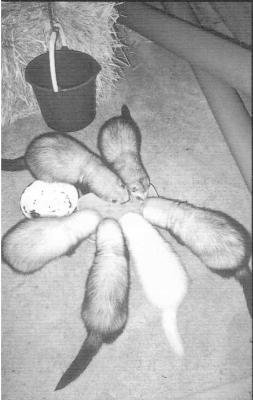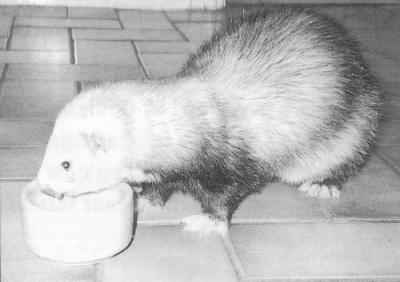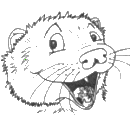Back to Basics - Diet
Our Back to Basics series is aimed at people who fall in love with all our beautiful ferrets at shows, rescue centre open days and public relations events but who are, very wisely, taking time to do a bit of research before introducing their own into the family. They often buy Ferrets First to get the feel of the ferret world and we think they deserve a feature of their own. Basics really does mean basics, so knowledgeable readers - look away now!
We've come a long way since the most important dietary advice was: "Don't feed bread and milk". Nowadays, we are far more likely to ask: "What is best for my ferret?"
The arrival in Britain of complete ferret food made meal times quick and easy. You don't have to grapple with bits of dead rabbit to keep your ferret fit and healthy, although fresh rabbit is a popular and nutritious meal.
Most pet shops sell bags of ferret food and it is as simple to feed a ferret as a dog or cat
Louise Holden, nutritional advisor with James Wellbeloved, makers of Ferret Complete, says ferrets have higher energy needs and a shorter digestive tract than cats or dogs and their primary protein source must be meat.
Ferret digestions are also relatively inefficient at absorbing vegetable proteins so they derive little benefit from the corn and soya protein sources found in many cat and dog foods. The main protein source in Ferret Complete is turkey meat meal to give a higher protein level of 36%.
Fat is a vital ingredient in ferrets' nutrition. Ferret Complete has a high fat level of 19%, derived mainly from turkey fat. The food also includes whole ground linseed for soft, shiny, coats.
Louise says that many owners traditionally fed their ferrets day-old chicks and raw meat. These attract flies and can rapidly go bad, causing stomach upsets. She adds that new evidence suggests that egg white found in chicks can cause bald patches in ferrets' coats.
To help maintain a ferret's health and longevity, James Wellbeloved now adds a nutural source of M.O.S. (manno-oligosaccharides). This helps to stimulate a ferret's immune system, reduce the build-up of pathogens such as salmonella and e.coli, and increase the beneficial lactobacillus (a friendly gut bacteria).
 Another popular brand of complete food is Alpha Ferret Feast, which is free from any artificial colourants. The oils incorporated throughout the pellet stay in the pellet, helping to prevent teeth staining.
Another popular brand of complete food is Alpha Ferret Feast, which is free from any artificial colourants. The oils incorporated throughout the pellet stay in the pellet, helping to prevent teeth staining.
Do not feed products that have vegetable proteins high on the list of ingredients or those which do not specify sources or merely list 'animal protein products' or 'plant protein products'.
Complete foods contain all the vitamins needed by your ferret under normal circumstances. It can be dangerous to supplement a complete food with additional vitamins.
Although complete food is often a ferret's staple diet, many owners like to vary meals. Fresh rabbit, raw mince and cooked chicken are popular choices. Other foods might include egg, cucumber, tomato banana and apple.
Michael Sanderson feeds Logun, British Supreme Champion 2001, and his other ferrets a varied diet. Half is complete ferret food and high protein complete cat biscuits. The rest is fresh chicken drumsticks and wings and fresh rabbit. He recommends cod liver oil for a shiny coat.
 Dr June McNicholas, publicity officer with the National Ferret Welfare Society, who studies ferrets' health and diet, feeds most of her ferrets on Supreme's Frankie Ferret.
Dr June McNicholas, publicity officer with the National Ferret Welfare Society, who studies ferrets' health and diet, feeds most of her ferrets on Supreme's Frankie Ferret.
She told Ferrets First: We did some testing for them and I kept it on as our feed because the ferrets preferred it and it's good value.
"My old ferrets are not on any dried food at all. I prepare a geriatic mix for them - meat, fish, chicken livers and chicken fat with a vitamin supplement. I change from dry feeds to this sort of mix gradually, from about five years old."
Some people feed their ferrets once a day, some twice, while others use the 'graze' method, allowing them to eat from a bowl of dry food as they want.
Nowadays, many owners overfeed their ferrets, especially if they are rescues who have suffered hunger and neglect. It is tempting to over-indulge a new arrival on the basis that he or she "deserves only the best from now on". The editor pleads guilty here. It took a tactful vet to tell me that little Daisy, who was found starving four months earlier, was now almost spherical. And a working ferret man judging a show near Mansfield took one look at Hamish, my huge polecat, and said: "I've seen skinnier badgers, duck."
Finally, don't forget water. It is the most important daily requirement. This is even more the case when feeding dry foods. It is becoming a matter of concern to some researchers whether ferrets voluntarily drink enough fluid to replace what is missing in a dry diet.
